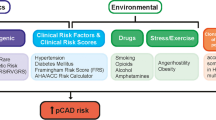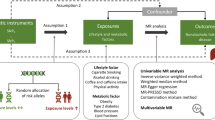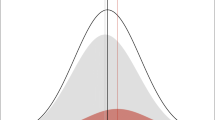Abstract
Purpose of review
A polygenic risk score (PRS) is a measure of genetic liability to a disease and is typically normally distributed in a population. Individuals in the upper tail of this distribution often have relative risk equivalent to that of monogenic form of the disease. The majority of currently available PRSs for coronary heart disease (CHD) have been generated from cohorts of European ancestry (EUR) and vary in their applicability to other ancestry groups. In this report, we review the performance of PRSs for CHD across different ancestries and efforts to reduce variability in performance including novel population and statistical genetics approaches.
Recent Findings
PRSs for CHD perform robustly in EUR populations but lag in performance in non-EUR groups, particularly individuals of African ancestry. Several large consortia have been established to enable genomic studies in diverse ancestry groups and develop methods to improve PRS performance in multi-ancestry contexts as well as admixed individuals. These include fine-mapping to ascertain causal variants, trans ancestry meta-analyses, and ancestry deconvolution in admixed individuals.
Summary
PRSs are being used in the clinical setting but enthusiasm has been tempered by the variable performance in non-EUR ancestry groups. Increasing diversity in genomic association studies and continued innovation in methodological approaches are needed to improve PRS performance in non-EUR individuals for equitable implementation of genomic medicine.

Similar content being viewed by others
References
Papers of particular interest, published recently, have been highlighted as: • Of importance •• Of major importance
Roth GA, Abate D, Abate KH, et al. Global, regional, and national age-sex-specific mortality for 282 causes of death in 195 countries and territories, 1980–2017: a systematic analysis for the Global Burden of Disease Study 2017. Lancet. 2018;392:1736–88.
Joseph P, Leong D, McKee M, Anand SS, Schwalm J-D, Teo K, et al. Reducing the Global Burden of Cardiovascular Disease, Part 1: The Epidemiology and Risk Factors. Circ Res. 2017;121:677–94.
Aragam KG, Pradeep N. Polygenic Scores to Assess Atherosclerotic Cardiovascular Disease Risk. Circ Res. 2020;126:1159–77.
Ripatti S, Tikkanen E, Orho-Melander M, et al. A multilocus genetic risk score for coronary heart disease: case-control and prospective cohort analyses. Lancet. 2010;376:1393–400.
Tada H, Melander O, Louie JZ, Catanese JJ, Rowland CM, Devlin JJ, et al. Risk prediction by genetic risk scores for coronary heart disease is independent of self-reported family history. Eur Heart J. 2016;37:561–7.
Ding K, Bailey KR, Kullo IJ. Genotype-informed estimation of risk of coronary heart disease based on genome-wide association data linked to the electronic medical record. BMC Cardiovasc Disord. 2011;11:66.
Inouye M, Abraham G, Nelson CP, et al. Genomic Risk Prediction of Coronary Artery Disease in 480,000 Adults: Implications for Primary Prevention. J Am Coll Cardiol. 2018;72:1883–93.
•• Khera AV, Chaffin M, Aragam KG, et al. Genome-wide polygenic scores for common diseases identify individuals with risk equivalent to monogenic mutations. Nat Genet. 2018. https://doi.org/10.1038/s41588-018-0183-z. Findings from these two studies (Ref #7,8) suggest that incorporating millions of variants across the genome significantly enhances predictive performance of polygenic risk scores for a variety of traits including coronary heart disease.
Abraham G, Havulinna AS, Bhalala OG, et al. Genomic prediction of coronary heart disease. Eur Heart J. 2016;37:3267–78.
Fahed AC, Wang M, Homburger JR, et al. Polygenic background modifies penetrance of monogenic variants for tier 1 genomic conditions. Nat Commun. 2020;11:3635.
Khera AV, Chaffin M, Zekavat SM, et al. Whole Genome Sequencing to Characterize Monogenic and Polygenic Contributions in Patients Hospitalized with Early-Onset Myocardial Infarction. Circulation. 2018.
Klarin D, Natarajan P. Clinical utility of polygenic risk scores for coronary artery disease. Nat Rev Cardiol. 2021;1–11.
Kullo IJ, Jouni H, Austin EE, et al. Incorporating a Genetic Risk Score Into Coronary Heart Disease Risk Estimates: Effect on Low-Density Lipoprotein Cholesterol Levels (the MI-GENES Clinical Trial). Circulation. 2016;133:1181–8.
Kathiresan S, Melander O, Anevski D, et al. Polymorphisms associated with cholesterol and risk of cardiovascular events. N Engl J Med. 2008;358:1240–9.
Khera AV, Emdin CA, Drake I, et al. Genetic Risk, Adherence to a Healthy Lifestyle, and Coronary Disease. N Engl J Med. 2016;375:2349–58.
Natarajan P, Young R, Stitziel NO, et al. Polygenic Risk Score Identifies Subgroup With Higher Burden of Atherosclerosis and Greater Relative Benefit From Statin Therapy in the Primary Prevention Setting. Circulation. 2017;135:2091–101.
• Dikilitas O, Schaid DJ, Kosel ML, et al. Predictive Utility of Polygenic Risk Scores for Coronary Heart Disease in Three Major Racial and Ethnic Groups. Am J Hum Genet. 2020;106:707–716. This study demonstrates that the predictive performance of a genome wide PRS for CHD is attenuated when applied to non European ancestry groups, particularly African ancestry.
Sun L, Pennells L, Kaptoge S, et al. Polygenic risk scores in cardiovascular risk prediction: A cohort study and modelling analyses. PLoS Med. 2021;18: e1003498.
Tikkanen E, Havulinna AS, Palotie A, Salomaa V, Ripatti S. Genetic risk prediction and a 2-stage risk screening strategy for coronary heart disease. Arterioscler Thromb Vasc Biol. 2013;33:2261–6.
Manolio TA, Collins FS, Cox NJ, et al. Finding the missing heritability of complex diseases. Nature. 2009;461:747–53.
Musunuru K, Kathiresan S. Genetics of Common, Complex Coronary Artery Disease. Cell. 2019;177:132–45.
Manolio TA. Using the Data We Have: Improving Diversity in Genomic Research. Am J Hum Genet. 2019;105:233–6.
Sirugo G, Williams SM, Tishkoff SA. The Missing Diversity in Human Genetic Studies. Cell. 2019;177:26–31.
Fahed AC, Aragam KG, Hindy G, et al. Transethnic Transferability of a Genome-Wide Polygenic Score for Coronary Artery Disease. Circ Genom Precis Med. 2021;14:e003092.
Assimes T, Tcheandjieu C, Zhu X, et al. A large-scale multi-ethnic genome-wide association study of coronary artery disease. 2021. https://doi.org/10.21203/rs.3.rs-275591/v1.
Clarke SL, Assimes TL, Tcheandjieu C. The propagation of racial disparities in cardiovascular genomics research. Circ Genom Precis Med. 2021. https://doi.org/10.1161/circgen.121.003178.
Martin AR, Gignoux CR, Walters RK, Wojcik GL, Neale BM, Gravel S, et al. Human Demographic History Impacts Genetic Risk Prediction across Diverse Populations. Am J Hum Genet. 2017;100:635–49.
Martin AR, Kanai M, Kamatani Y, Okada Y, Neale BM, Daly MJ. Clinical use of current polygenic risk scores may exacerbate health disparities. Nat Genet. 2019;51:584–91.
Privé F, Aschard H, Carmi S, Folkersen L, Hoggart C, O’Reilly PF, et al. Portability of 245 polygenic scores when derived from the UK Biobank and applied to 9 ancestry groups from the same cohort. Am J Hum Genet. 2022;109:12–23.
Aragam KG, Dobbyn A, Judy R, et al. Limitations of Contemporary Guidelines for Managing Patients at High Genetic Risk of Coronary Artery Disease. J Am Coll Cardiol. 2020;75:2769–80.
Samani NJ, Erdmann J, Hall AS, et al. Genomewide association analysis of coronary artery disease. N Engl J Med. 2007;357:443–53.
McPherson R, Pertsemlidis A, Kavaslar N, et al. A common allele on chromosome 9 associated with coronary heart disease. Science. 2007;316:1488–91.
Helgadottir A, Thorleifsson G, Manolescu A, et al. A common variant on chromosome 9p21 affects the risk of myocardial infarction. Science. 2007;316:1491–3.
Graham SE, Clarke SL, Wu K-HH, et al. The power of genetic diversity in genome-wide association studies of lipids. Nature. 2021. https://doi.org/10.1038/s41586-021-04064-3.
Ruan Y, Lin Y-F, Feng Y-CA, et al. Improving polygenic prediction in ancestrally diverse populations. Nat Genet. 2002;54:573–80.
Amariuta T, Ishigaki K, Sugishita H, et al. Improving the trans-ancestry portability of polygenic risk scores by prioritizing variants in predicted cell-type-specific regulatory elements. Nat Genet. 2020. https://doi.org/10.1038/s41588-020-00740-8.
Weissbrod O, Kanai M, Shi H, et al. Leveraging fine-mapping and non-European training data to improve trans-ethnic polygenic risk scores. 2021. bioRxiv. https://doi.org/10.1101/2021.01.19.21249483
Marnetto D, Pärna K, Läll K, Molinaro L, Montinaro F, Haller T, et al. Ancestry deconvolution and partial polygenic score can improve susceptibility predictions in recently admixed individuals. Nat Commun. 2020;11:1628.
Privé F, Arbel J, Vilhjálmsson BJ. LDpred2: better, faster, stronger. Bioinformatics. 2020. https://doi.org/10.1093/bioinformatics/btaa1029.
Maples BK, Gravel S, Kenny EE, Bustamante CD. RFMix: a discriminative modeling approach for rapid and robust local-ancestry inference. Am J Hum Genet. 2013;93:278–88.
Liu J, Lewinger JP, Gilliland FD, Gauderman WJ, Conti DV. Confounding and heterogeneity in genetic association studies with admixed populations. Am J Epidemiol. 2013;177:351–60.
Wünnemann F, Sin Lo K, Langford-Avelar A, Busseuil D, Dubé M-P, Tardif J-C, et al. Validation of Genome-Wide Polygenic Risk Scores for Coronary Artery Disease in French Canadians. Circ Genom Precis Med. 2019;12:e002481.
Wang M, Menon R, Mishra S, et al. Validation of a Genome-Wide Polygenic Score for Coronary Artery Disease in South Asians. J Am Coll Cardiol. 2020;76:703–14.
Koyama S, Ito K, Terao C, et al. Population-specific and trans-ancestry genome-wide analyses identify distinct and shared genetic risk loci for coronary artery disease. Nat Genet. 2020. https://doi.org/10.1038/s41588-020-0705-3.
CARDIoGRAMplusC4D - CARDIoGRAMplusC4D Consortium. http://www.cardiogramplusc4d.org/. Accessed 9 Jan 2022.
Electronic Medical Records and Genomics (eMERGE) Network. https://www.genome.gov/Funded-Programs-Projects/Electronic-Medical-Records-and-Genomics-Network-eMERGE. Accessed 9 Jan 2022.
Polygenic RIsk MEthods in Diverse populations (PRIMED) Consortium. https://www.genome.gov/Funded-Programs-Projects/PRIMED-Consortium. Accessed 9 Jan 2022.
All of Us Research Program Investigators, Denny JC, Rutter JL, Goldstein DB, Philippakis A, Smoller JW, Jenkins G, Dishman E. The “All of Us” Research Program. N Engl J Med. 2019;381:668–676.
Hunter-Zinck H, Shi Y, Li M, et al. Genotyping Array Design and Data Quality Control in the Million Veteran Program. Am J Hum Genet. 2020;106:535–48.
Taliun D, Harris DN, Kessler MD, et al. Sequencing of 53,831 diverse genomes from the NHLBI TOPMed Program. Nature. 2021;590:290–9.
The Emirati Genome Programme - The Official Portal of the UAE Government. https://u.ae/en/information-and-services/health-and-fitness/the-emirati-genome-programme. Accessed 14 Jan 2022.
H3Africa. In: H3Africa. 2018. https://h3africa.org/. Accessed 14 Jan 2022.
El-Menyar A, Al Suwaidi J, Badii R, Mir F, Dalenberg AK, Kullo IJ. Discovering Novel Biochemical and Genetic Markers for Coronary Heart Disease in Qatari Individuals: The Initiative Qatar Cardiovascular Biorepository. Heart Views. 2020;21:6–16.
Nagai A, Hirata M, Kamatani Y, et al. Overview of the BioBank Japan Project: Study design and profile. J Epidemiol. 2017;27:S2–8.
Sudlow C, Gallacher J, Allen N, et al. UK biobank: an open access resource for identifying the causes of a wide range of complex diseases of middle and old age. PLoS Med. 2015;12:e1001779.
Chen Z, Chen J, Collins R, Guo Y, Peto R, Wu F, et al. China Kadoorie Biobank of 0.5 million people: survey methods, baseline characteristics and long-term follow-up. Int J Epidemiol. 2011;40:1652–66.
Wei C-Y, Yang J-H, Yeh E-C, et al. Genetic profiles of 103,106 individuals in the Taiwan Biobank provide insights into the health and history of Han Chinese. NPJ Genom Med. 2021;6:10.
Goff DC Jr, Lloyd-Jones DM, Bennett G, et al. 2013 ACC/AHA guideline on the assessment of cardiovascular risk: a report of the American College of Cardiology/American Heart Association Task Force on Practice Guidelines. Circulation. 2014;129:S49-73.
D’Agostino RB Sr, Vasan RS, Pencina MJ, Wolf PA, Cobain M, Massaro JM, et al. General cardiovascular risk profile for use in primary care: the Framingham Heart Study. Circulation. 2008;117:743–53.
Hippisley-Cox J, Coupland C, Brindle P. Development and validation of QRISK3 risk prediction algorithms to estimate future risk of cardiovascular disease: prospective cohort study. BMJ. 2017;357:j2099.
McClelland RL, Jorgensen NW, Budoff M, et al. 10-Year Coronary Heart Disease Risk Prediction Using Coronary Artery Calcium and Traditional Risk Factors: Derivation in the MESA (Multi-Ethnic Study of Atherosclerosis) With Validation in the HNR (Heinz Nixdorf Recall) Study and the DHS (Dallas Heart Study). J Am Coll Cardiol. 2015;66:1643–53.
SCORE2 working group and ESC Cardiovascular risk collaboration. SCORE2 risk prediction algorithms: new models to estimate 10-year risk of cardiovascular disease in Europe. Eur Heart J. 2021;42:2439–54.
SCORE2-OP working group and ESC Cardiovascular risk collaboration, de Vries TI, Cooney MT, et al. SCORE2-OP risk prediction algorithms: estimating incident cardiovascular event risk in older persons in four geographical risk regions. Eur Heart J. https://doi.org/10.1093/eurheartj/ehab312.
Arnett DK, Blumenthal RS, Albert MA, et al. 2019 ACC/AHA Guideline on the Primary Prevention of Cardiovascular Disease: A Report of the American College of Cardiology/American Heart Association Task Force on Clinical Practice Guidelines. J Am Coll Cardiol. 2019;74:e177–232.
Visseren FLJ, Mach F, Smulders YM, et al. 2021 ESC Guidelines on cardiovascular disease prevention in clinical practice. Eur Heart J. 2021;42:3227–337.
Virani SS, Alonso A, Aparicio HJ, et al. Heart Disease and Stroke Statistics-2021 Update: A Report From the American Heart Association. Circulation. 2021;143:e254–743.
Volgman AS, Palaniappan LS, Aggarwal NT, et al. Atherosclerotic Cardiovascular Disease in South Asians in the United States: Epidemiology, Risk Factors, and Treatments: A Scientific Statement From the American Heart Association. Circulation. 2018;138:e1–34.
Van Calster B, McLernon DJ, van Smeden M, Wynants L, Steyerberg EW, Topic Group “Evaluating diagnostic tests and prediction models” of the STRATOS initiative. Calibration: the Achilles heel of predictive analytics. BMC Med. 2019;17:230.
Wand H, Lambert SA, Tamburro C, et al. Improving reporting standards for polygenic scores in risk prediction studies. Nature. 2021;591:211–9.
Elliott J, Bodinier B, Bond TA, Chadeau-Hyam M, Evangelou E, Moons KGM, et al. Predictive Accuracy of a Polygenic Risk Score-Enhanced Prediction Model vs a Clinical Risk Score for Coronary Artery Disease. JAMA. 2020;323:636–45.
Mosley JD, Gupta DK, Tan J, et al. Predictive Accuracy of a Polygenic Risk Score Compared With a Clinical Risk Score for Incident Coronary Heart Disease. JAMA. 2020;323:627–35.
Lambert SA, Gil L, Jupp S, et al. The Polygenic Score Catalog as an open database for reproducibility and systematic evaluation. Nat Genet. 2021. https://doi.org/10.1038/s41588-021-00783-5.
Kullo IJ, Dikilitas O. Polygenic Risk Scores for Diverse Ancestries: Making Genomic Medicine Equitable∗. J Am Coll Cardiol. 2020;76:715–8.
Chatterjee N, Shi J, García-Closas M. Developing and evaluating polygenic risk prediction models for stratified disease prevention. Nat Rev Genet. 2016;17:392–406.
Kullo IJ, Lewis CM, Inouye M, Martin AR, Ripatti S. Chatterjee N (2022) Polygenic scores in biomedical research. Nat Rev Genet. 2022. https://doi.org/10.1038/s41576-022-00470-z.
Funding
I.J.K. was supported by NHGRI grant HG006379 and HG011710 as well as NHLBI grant K24 HL137010. D.J.S. was supported by the U.S. Public Health Service and NIH grant R35 GM140487. The contents of this article are solely the responsibility of the authors and do not necessarily represent the official views of the National Institutes of Health. OD was supported by Mayo Clinic Clinician-Investigator Training Program.
Author information
Authors and Affiliations
Corresponding author
Ethics declarations
Conflict of Interest
The authors declare that they have no conflict of interest.
Human and Animal Rights and Informed Consent
This article does not contain any studies with human or animal subjects performed by any of the authors.
Additional information
Publisher's Note
Springer Nature remains neutral with regard to jurisdictional claims in published maps and institutional affiliations.
This article is part of the Topical Collection on Cardiovascular Genomics
Rights and permissions
About this article
Cite this article
Dikilitas, O., Schaid, D.J., Tcheandjieu, C. et al. Use of Polygenic Risk Scores for Coronary Heart Disease in Ancestrally Diverse Populations. Curr Cardiol Rep 24, 1169–1177 (2022). https://doi.org/10.1007/s11886-022-01734-0
Accepted:
Published:
Issue Date:
DOI: https://doi.org/10.1007/s11886-022-01734-0




